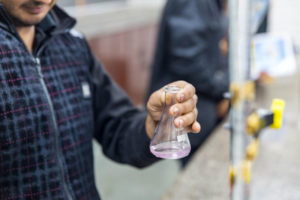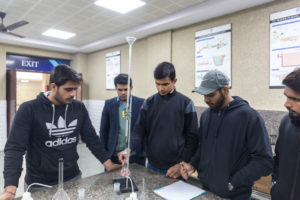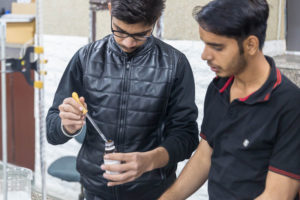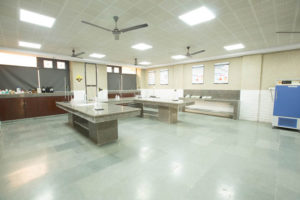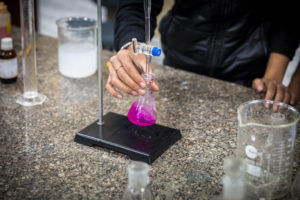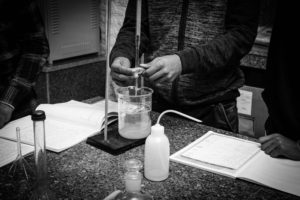Environmental Engineering is a profession directly involved with the identification and design of solutions to environmental problems. Environmental Engineers are directly responsible for providing safe drinking water, minimizing and preventing pollution in rivers, lakes, and oceans, treating and properly disposing of municipal, industrial and hazardous waste, and the remediation of contaminated soil and water, among other charges of the profession. Understanding and mastering the art of Environmental Engineering requires the integration of biology, chemistry, physics, mathematics, computer science, laboratory analyses, and communication skills. Experiments include measuring conventional water and wastewater parameters as well as exploring the natural environment.
Environmental Engineers study water, soil, and air pollution problems, and develop technical solutions needed to solve, attenuate or control these problems in a manner that is compatible with legislative, economic, social and political concerns. They use core engineering skills and a deep understanding of the physical, chemical and biological principles of the local, regional and global environment to help change the world.
Civil engineers are particularly involved in such activities as water supply and sewerage, management of surface water and groundwater quality, remediation of contaminated sites and solid waste management.The pulse of today’s world beats with the technological revolution, population dynamics, environmental concerns, urban development and more. As a result, civil and environmental engineers must be creative problem solvers to meet the challenges of the 21st century.
The Environmental Engineering Laboratory is soundly equipped to meet the academic requirements of the undergraduate programme. It is with turbidity meter, BOD incubators, pH meters, conductivity meters and other equipment dedicated to water and wastewater quality analysis. The laboratory offers students, hands-on exposure to approved water and wastewater quality testing procedures as is normally done at a water and wastewater treatment plant.
This laboratory is mainly the application of basic chemistry and chemical calculations to measure physical, chemical, and bacteriological parameters of water and wastewater. Laboratory methods and interpretation of results with regard to environmental engineering applications such as design and operation of water and wastewater treatment processes, and to the control of the quality of natural water.
Course Objectives
- To introduce students to how the common environmental experiments relating to water and wastewater quality are performed.
- This course will help students know which tests are appropriate for given environmental problems, statistically interpret laboratory results and apply the laboratory results to problem identification, quantification, and basic environmental design and technical solutions.
Course Outcomes
Students who successfully complete this course will be able to:
- Perform common environmental experiments relating to water and wastewater quality, and know which tests are appropriate for given environmental problems.
- Statistically analyze and interpret laboratory results.
- Apply the laboratory results to problem identification, quantification, and basic environmental design and technical solutions.
- Understand and use the water and wastewater sampling procedures and sample preservations.
- Understand the impact of water and wastewater treatment on people and the environment.
- Understand and apply ethical issues associated with decision making and professional conduct in the laboratory and field environment.
- Obtain the necessary background for subsequent courses in environmental engineering.
Sanitation is a large part of our civil evolution; without it, we would succumb more often to water-borne disease and illness – raising our mortality rates and lowering our quality of life. Therefore, we’ve always needed to find bigger and better ways of taking away our sewage, cleaning our water and harnessing natural or artificial water supplies for our health and environment. The modern environmental engineer is dedicated to keeping our air and water clean of pollutants and promoting good health and these days, protection against radioactive and toxic materials too; they also study the potential effects of climate change and other environmental factors on the infrastructure.

